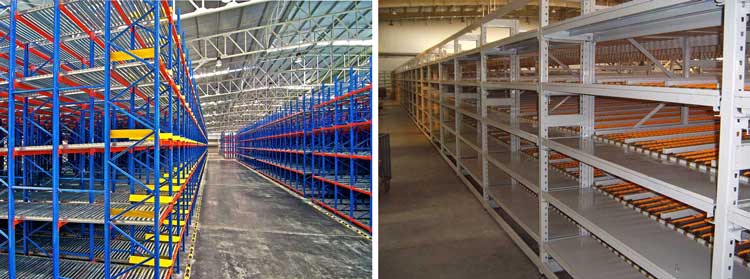What are the differences between carton flow racks and gravity racks?
We all know that both carton flow racks and gravity racks belong to roller-type racks, which belong to the type of racks with sloping tracks. They can use the weight of the goods themselves to store them from the high end to the low end and take them out. However, although the two are very similar in use, their structures are vastly different. So what is the difference between them?
When we purchase racks, the first thing we look at is the price. From the perspective of price, gravity racks are much more expensive than carton flow racks. In fact, the functions of the two types of racks are basically the same, so regardless of which type of roller rack to choose, it is mainly based on their own needs to measure and check the types of goods stored on-site to make reasonable planning and control costs.
Secondly, the load capacity of the two types of warehouse racks is also different. The load capacity of the carton flow rack is usually around 500kg, while the load capacity of a single pallet of the gravity rack is generally within 1000kg. Not only do they have different load-bearing capacities, but the main structure of the two racks is also different. Medium-duty racks use the frame of medium racks, while gravity racks use the frame of heavy-duty racks. In addition, there are differences in the internal structure between the two. In addition to being equipped with rollers, gravity racks also have devices such as guide plates and damping rollers. However, compared to gravity racks, carton flow racks are relatively simple, with only carton flow bars as the basic configuration.
Moreover, the gravity racks are very environmentally friendly, all of which use unpowered forms, have no energy consumption, low noise, are safe and reliable, and can operate at full load. The carton flow bars of the carton flow racks are directly connected to the front and rear crossbeams and the middle support beams, and the crossbeams are directly hung on the pillars. When there are many types of goods, the picking route is too long, and the picking efficiency is low. When the picking area is large, the handling system setting is also quite troublesome, and it is likely to overturn in the end.
No matter what type of rack they are, they all have their own advantages and disadvantages. In addition to knowing the function and quality of the rack, we also need to know a very important factor when choosing a rack, which is our own situation. Only by selecting the most suitable rack for the warehouse can we maximize the effectiveness of the rack.
